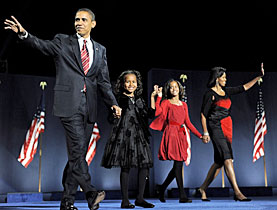Foreign policy under Obama remains an unknown

Europe can expect smoother transatlantic relations under President-elect Barack Obama, but faces an unclear US foreign policy, political scientists say.
Analysts in Switzerland say that although the historic election result will have a profound effect domestically, Obama’s strategy for dealing with the rest of the world is yet to be determined.
“A more than 200-year history of discrimination and disenfranchisement of black Americans has, if not come to an end, been radically challenged,” Professor James Davis, director of the Institute of Political Science in St Gallen, told swissinfo.
“I think we certainly have turned a page in history and can start to look forward to a very different and positive future.”
Likewise, there is hope that the new president will try to reverse any negative sentiment that has developed between Europe and the US in recent years.
“On January 20 the Bush era will be over and one of the most difficult periods in transatlantic relations will have come to an end,” Davis said.
“I expect quite a bit of goodwill on both sides of the Atlantic and an effort on both sides to restructure the relationship and to normalise relations.”
He argues that there will be a change in tone from the new leader, with less “bashing” of the United Nations, more multilateral approaches to problem-solving and more policy substance, particularly with a view to acting on climate change.
Obama is a proponent of binding targets of reductions of CO2 emissions and Europe can expect “real progress” in setting and meeting targets, he says.
Bumpy road
But in the longer term, he says, Europe will see differences of opinion in some areas.
While trying to apply lessons learnt from Iraq in drawing up a new strategy for Afghanistan, Obama could meet opposition from some leaders on issues such as increasing troops in the area.
“I can well imagine Barack Obama coming to the European partners and asking them to play their role in a new strategy. This might be very difficult for some, especially the Germans, who find themselves in an election cycle. So I can imagine there might be some bumps on the road ahead,” said Davis.
On Wednesday, Swiss Foreign Minister Micheline Calmy-Rey welcomed the election of the new president, saying Obama would usher in a “change in style” in American diplomacy.
What that entails is still unknown. Obama has already stood apart from his predecessors by saying he is willing to talk to one opponent, Iran, at a high level.
Davis added: “He has made clear that he is willing to speak to our adversaries or to states with whom we have a problem. The diplomatic approach is a means to an end but that only functions if in fact diplomacy is backed up or supported by other tools of state craft.”
He warns that the weight of hope of change will fall heavy on his shoulders.
“I do however think that the expectations are so great and go in so many different directions that no single president could meet them all. So there is the very serious risk of disappointment setting in at some point.”
Spark of change
For Professor David Sylvan, head of the political science unit at the Graduate Institute of International and Development Studies in Geneva, the election of Obama also signals a catalyst for great change within the US.
“It is possible that this could represent the beginning of a really major, once-every-half-a-century type of political realignment in the United States.”
“It is possible that this is that kind of an election because you are getting a discourse in the way that people are talking about things, in terms of everything from the importance of regulation of the economy to the importance of redistributing income, that really you have not heard in the United States for at least 40 years, arguably longer,” Sylvan told swissinfo.
“Since the US does play such an important part in the world in terms of setting the agenda for political debate in other countries, that is potentially very significant.”
Davis added: “When you look at America today and see a black face in the White House, that changes the image of America, both within the country and abroad.”
“I think this election reminds a number of Europeans who had begun to doubt the commitment of the American public to some basic principles that these principles are alive and well, and that there is this incredible ability of American society to heal itself and to correct past mistakes. And I think that came out loud and clear.”
swissinfo, Jessica Dacey
Professor David Sylvan has been a member of the Graduate Institute of International Studies in Geneva faculty since 1991 and is the current head of its political science unit. He also is engaged in collaborative research on US foreign policy, particularly on issues of client states and military intervention.
Professor James Davis is the director of the Institute for Political Science in St Gallen and specialises in international relations. A US citizen, he also writes a column for the Munich newspaper “tz” and has been a members of the European Journal of International Relations since 2006.
Professor David Sylvan, of the Graduate Institute of International and Development Studies in Geneva, foresees that change will come to America, as announced by Obama throughout his campaign and in his victory speech.
It will take the form of economic reforms, such as stricter regulations on Wall Street, a reorientation towards the middle class and respect for civil liberties.
To meet some of his campaign promises he will need to increase deficits rather than raise taxes.
His challenges will be solving issues including the financial crisis, addressing health care, developing energy policy and providing an economic stimulus. The big unknown will be Obama’s foreign policy.

In compliance with the JTI standards
More: SWI swissinfo.ch certified by the Journalism Trust Initiative











You can find an overview of ongoing debates with our journalists here . Please join us!
If you want to start a conversation about a topic raised in this article or want to report factual errors, email us at english@swissinfo.ch.